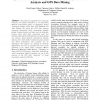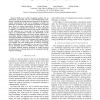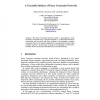169 search results - page 15 / 34 » Temporal Reasoning in Nested Temporal Networks with Alternat... |
IKE
2007
13 years 9 months ago
2007
- We present an application for analyzing temporal and spatial interaction in an Association Network environment based on integrating Global Positioning Systems (GPS) Data, RDF Met...
PERCOM
2011
ACM
12 years 11 months ago
2011
ACM
—While most activity recognition systems rely on data-driven approaches, the use of knowledge-driven techniques is gaining increasing interest. Research in this field has mainly...
UAI
1994
13 years 8 months ago
1994
Heckerman (1993) defined causal independence in terms of a set of temporal conditional independence statements. These statements formalized certain types of causal interaction whe...
IJCAI
2001
13 years 9 months ago
2001
In the future, webs of unmanned air and space vehicles will act together to robustly perform elaborate missions in uncertain environments. We coordinate these systems by introduci...
EUROCAST
2005
Springer
14 years 1 months ago
2005
Springer
The Fuzzy Constraint Networks model, a generalization of the Disjunctive Temporal Fuzzy Constraint Networks, is a framework that allows representing and reasoning with fuzzy qualit...



